News Blog
Latest News From Our Volunteers in Nepal
VOLUNTEER COMMUNITY CARE CLINICS IN NEPAL
Nepal remains one of the poorest countries in the world and has been plagued with political unrest and military conflict for the past decade. In 2015, a pair of major earthquakes devastated this small and fragile country.
Since 2008, the Acupuncture Relief Project has provided over 300,000 treatments to patients living in rural villages outside of Kathmandu Nepal. Our efforts include the treatment of patients living without access to modern medical care as well as people suffering from extreme poverty, substance abuse and social disfranchisement.
Common conditions include musculoskeletal pain, digestive pain, hypertension, diabetes, stroke rehabilitation, uterine prolapse, asthma, and recovery from tuberculosis treatment, typhoid fever, and surgery.
FEATURED CASE STUDIES
Rheumatoid Arthritis +

35-year-old female presents with multiple bilateral joint pain beginning 18 months previously and had received a diagnosis of…
Autism Spectrum Disorder +

20-year-old male patient presents with decreased mental capacity, which his mother states has been present since birth. He…
Spinal Trauma Sequelae with Osteoarthritis of Right Knee +
60-year-old female presents with spinal trauma sequela consisting of constant mid- to high grade pain and restricted flexion…
Chronic Vomiting +

80-year-old male presents with vomiting 20 minutes after each meal for 2 years. At the time of initial…
COMPASSION CONNECT : DOCUMENTARY SERIES

Episode 1
Rural Primary Care
In the aftermath of the 2015 Gorkha Earthquake, this episode explores the challenges of providing basic medical access for people living in rural areas.

Episode 2
Integrated Medicine
Acupuncture Relief Project tackles complicated medical cases through accurate assessment and the cooperation of both governmental and non-governmental agencies.

Episode 3
Working With The Government
Cooperation with the local government yields a unique opportunities to establish a new integrated medicine outpost in Bajra Barahi, Makawanpur, Nepal.

Episode 4
Case Management
Complicated medical cases require extraordinary effort. This episode follows 4-year-old Sushmita in her battle with tuberculosis.

Episode 5
Sober Recovery
Drug and alcohol abuse is a constant issue in both rural and urban areas of Nepal. Local customs and few treatment facilities prove difficult obstacles.

Episode 6
The Interpreters
Interpreters help make a critical connection between patients and practitioners. This episode explores the people that make our medicine possible and what it takes to do the job.

Episode 7
Future Doctors of Nepal
This episode looks at the people and the process of creating a new generation of Nepali rural health providers.

Compassion Connects
2012 Pilot Episode
In this 2011, documentary, Film-maker Tristan Stoch successfully illustrates many of the complexities of providing primary medical care in a third world environment.
From Our Blog
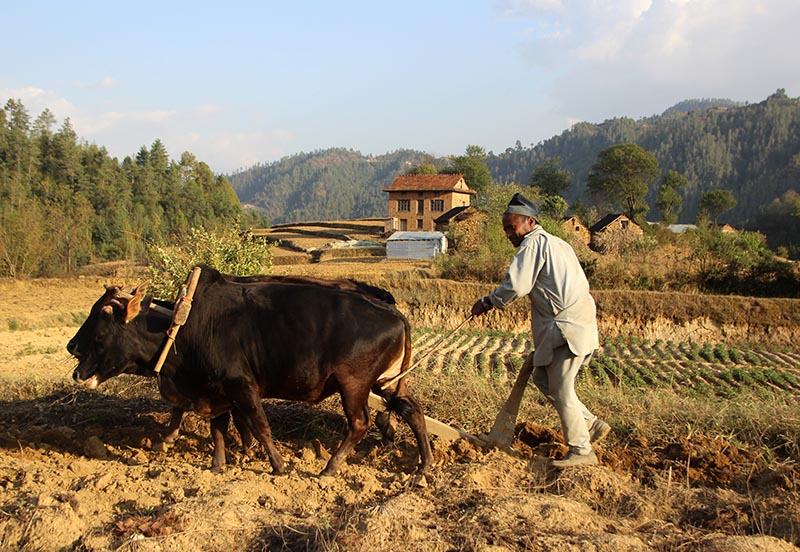
- Details
- By Trudy Wendelin
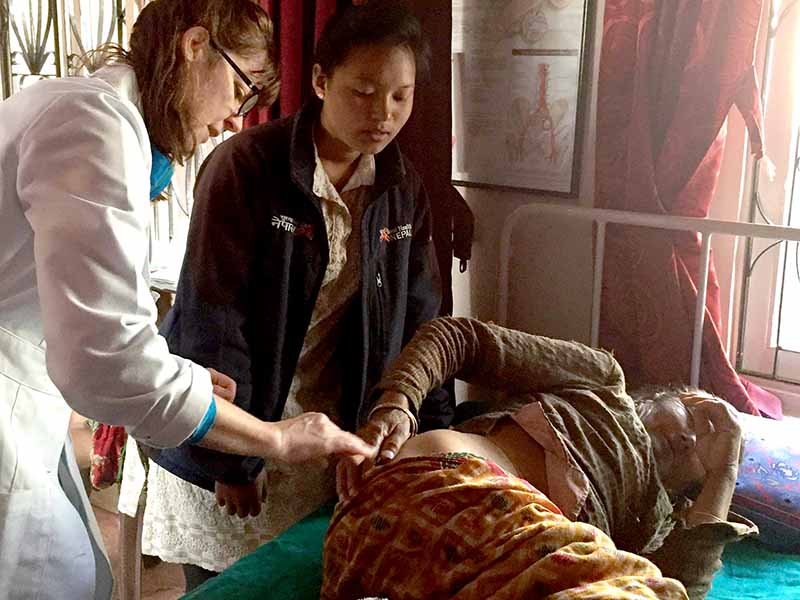
As an American Acupuncture volunteer for Acupuncture Relief Project (ARP) in Nepal, I stepped into an eastern culture that is a distant shadow of my own, regarding the traditional farming lifestyles amongst a rich, agricultural setting. Our group of 3 American and 1 Australian Acupuncture volunteers inhabited a farming village named Bajra Barahi, during March and April 2018. An authentic way to experience Nepal is by walking through the farming villages and fields, as agriculture is one of the largest contributions to this country’s economy. ARP is in the middle hills region or Pahad, mainly populated in river and stream bottoms that are good for agriculture. This region is the best place to experience village life, as it is the most traditional.
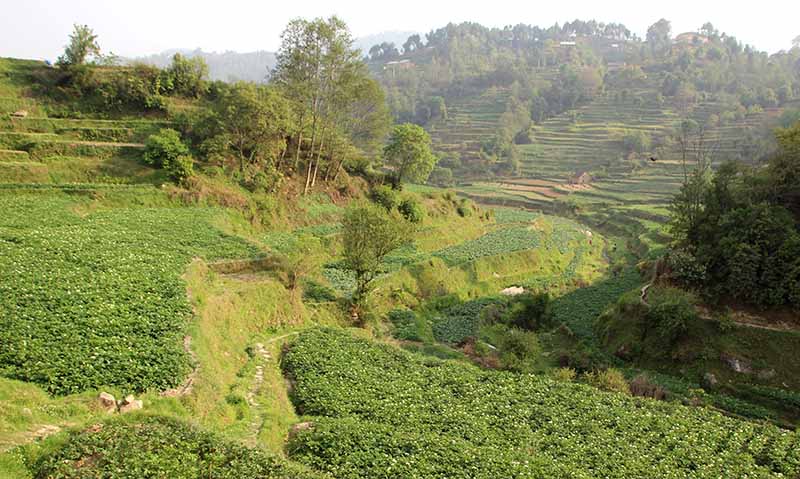
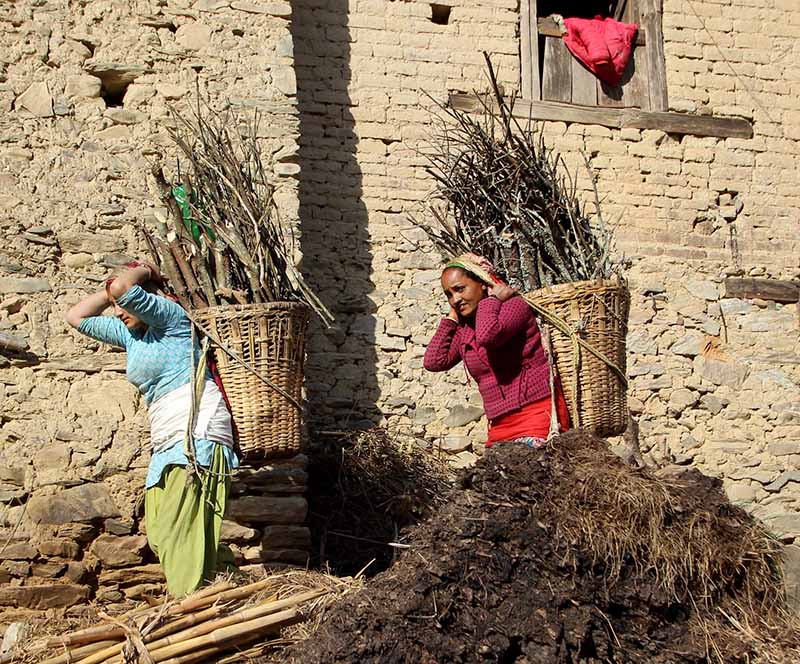
The agricultural landscapes of Nepal are lush and breathtaking, especially in the spring and summer when crops are flourishing. All year round the farmers are rotating seasonal crops, such as, potatoes, cauliflower, wheat, mustard, rice, cabbage and chile. It is mostly terraced along mountainsides, making use of all space from this rugged terrain. Imagine amongst this idyllic setting, being back in time 100 years ago in traditional farmlands: there are no tractors, no Monsanto, no combines, no corporate farming, no John Deere. Just the land, the people, goats, water buffalo and simple farming tools: hoes, scythes, plows, sickles, etc. Welcome to Nepal. One of the trademarks of rural Nepal is the Doko, a carrying basket made from durable bamboo, hand-woven in a v-shape, allowing the average person to carry 20-50 kg on their back. It has shoulder straps and head straps called namlo that take part of the load off the shoulders. Dokos are used to carry grains, goods, vegetables, compost, etc. It is common to see men, women and children carrying doko’s on their back with the namlo straps on heads and shoulders, throughout the villages and fields in rural Nepal.
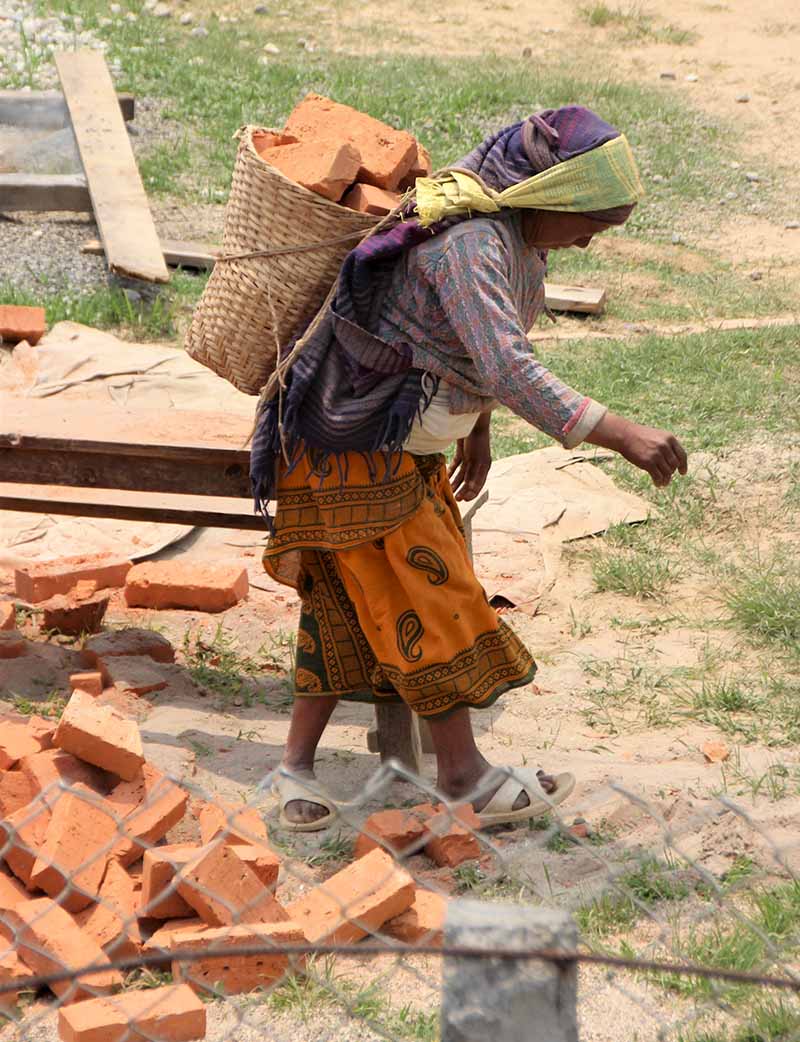
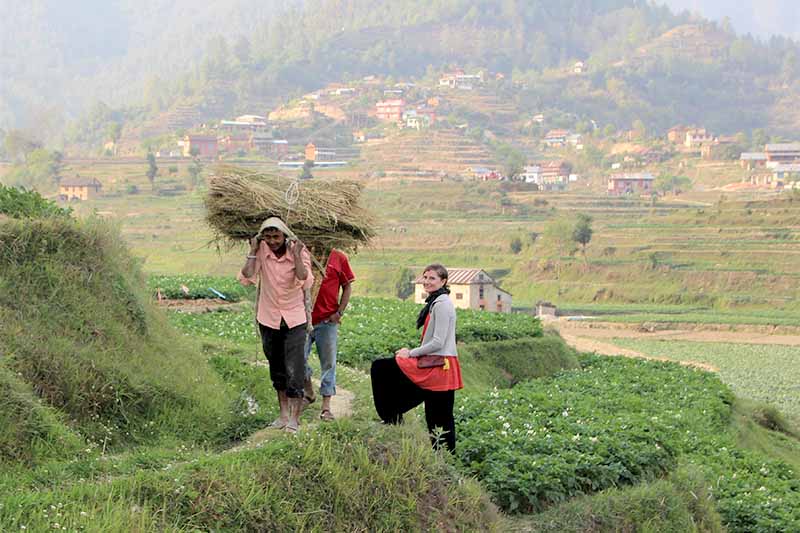
Now envision, a 73-year old woman with flip-flops, carrying 30 kg of potatoes in a doko on her back, climbing up steep terraces on rocks and dirt, or imagine a 60-year old man barefoot in the dirt, alone, hoeing a turf of land that is a part of a whole mountainside of terraced crops. When you spend time here, this western anomaly becomes a stereotypical reality in rural Nepal. Arriving in March during the planting season for potatoes and cauliflower, I witnessed many elderly women, looking to be in their 70’s, carrying dokos stuffed with compost taller than their own height, walking up and down steep hills. In awe, I even saw an elderly women walking with a Doko on her back full of BRICKS! (I have the photo to prove it!) In Nepal, everyone does the farming: elders, men, women and children. What I learned from my elder patients is that many of the young people have moved into Kathmandu to work, leaving the farming labor for their parents and grandparents, who do not know any differently than to keep farming. It came to my attention that more women than men work in the fields, because men leave the area (sometimes to foreign lands) to work for higher wages, leaving the women at home to manage the housework and farming.
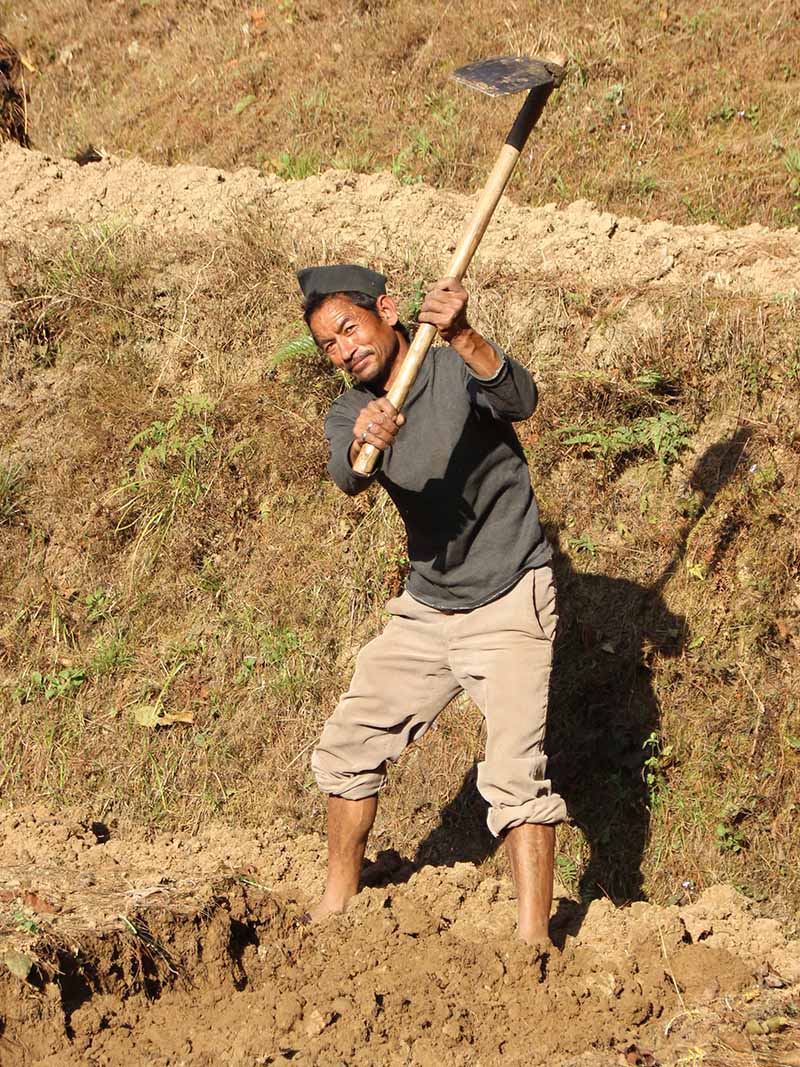
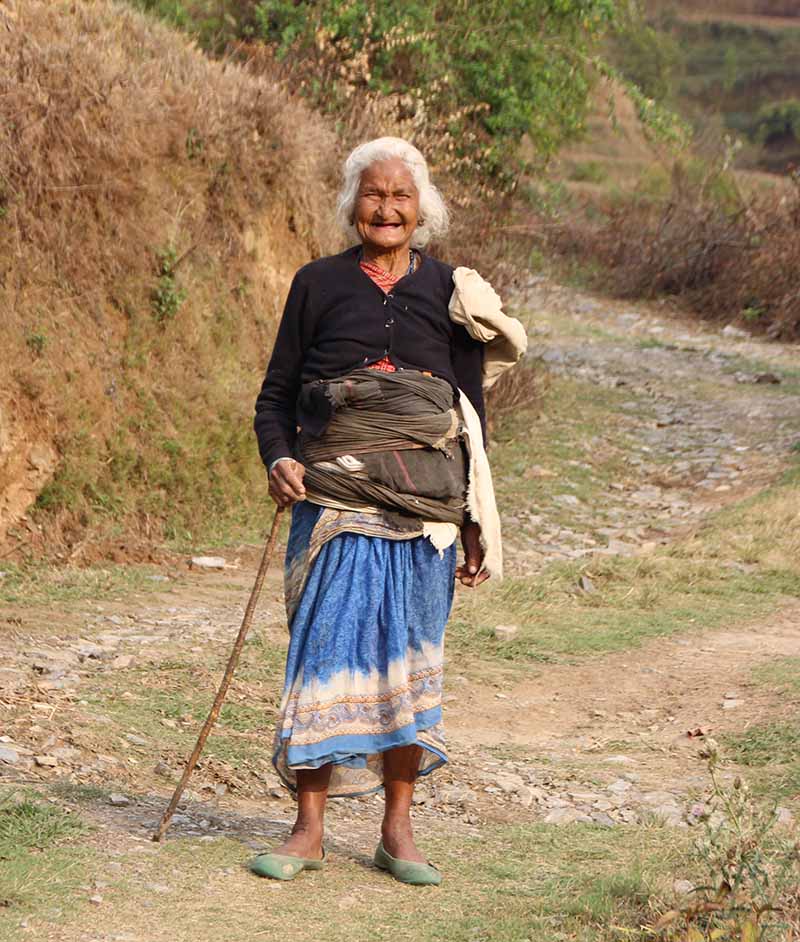
Their trodden paths are just as remarkable as the loads they carry. I took many walks and even got lost at times, going up, down and around steep passages, wandering through narrow terraced edges, upon stone paths and bridges and irrigation walls through the labyrinthine, lush fields. Our first week, another ARP volunteer, Alisha, and I got lost in the fields and were trying to navigate ourselves through the obstacle course. It was a big enough challenge to keep from spraining an ankle, as we tramped through mud, rocks, trees and branches that we grabbed for support. We neither one knew Nepali language, meeting farmers along the way. They seemed amused, greeting us, “Namaste”, then using gestures and pointing for advice on directions with a mischievous grin. Another day, we explored the fields with a Hindu temple in the valley, surrounded by mountainsides of cauliflower and potato crops. The Hindu music blasted loudly from the temple throughout the terraced fields, providing an amphitheater to amplify this vibrant music for the workers to hear. It was a fun, upbeat walk with everyone being energized mutually by the same music.
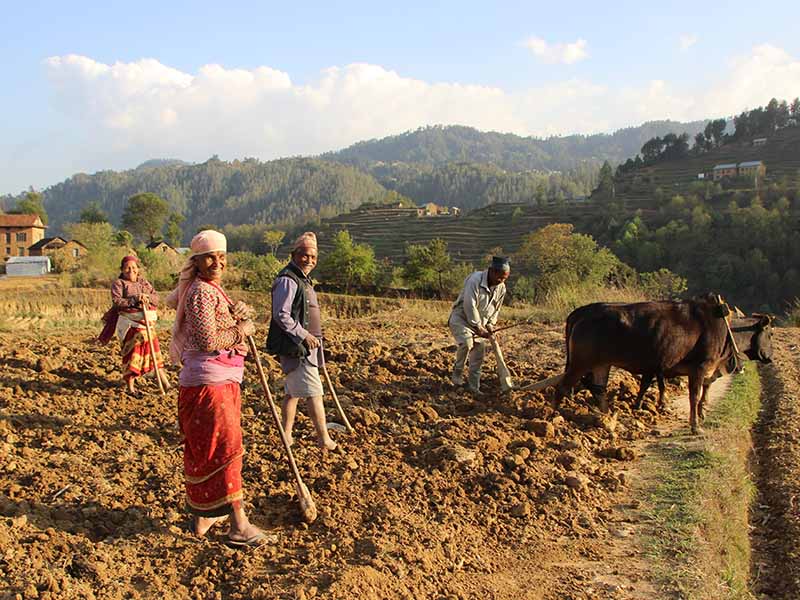

It was very helpful for me to immerse myself in the community and surrounding terraced farmlands with walks to meet the people and see how hard they work: this way I could relate and understand better my patients and their orthopedic issues. It’s obvious why so many of them have back and knee problems, sprained ankles and falls. One of my female patients amusingly told me how she recently fell: while walking with her doko full of goat feces (compost), she toppled over face down. She still managed to walk a couple miles into town for her acupuncture treatments, and of course, she is still working. This I heard many times from my patients, that they continue to work, even with pain and injuries because they say no one else can do it. With the trend for the young people moving to the city or foreign countries, this generation may be some of the last to uphold this farming and cultural tradition
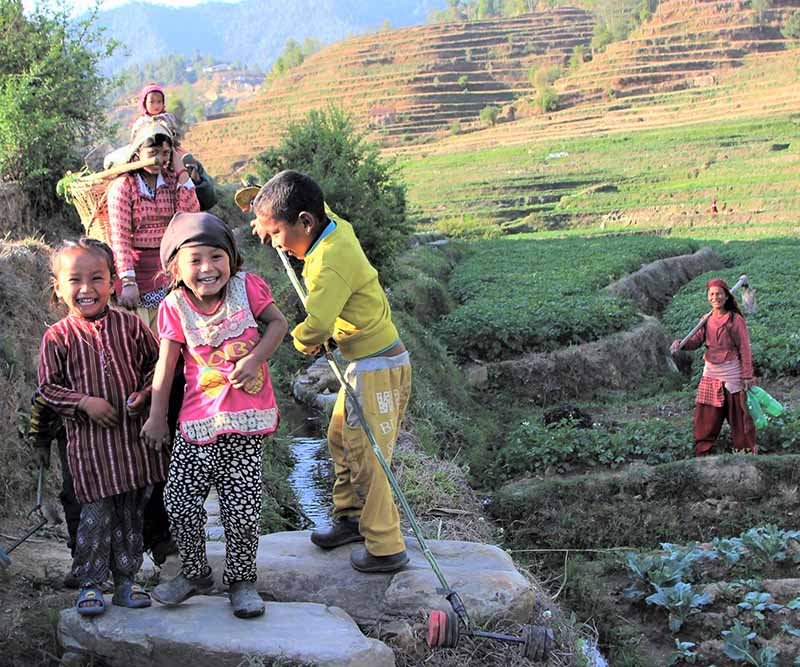
During my walks, I usually would cross paths with my patients working in the fields. One of my favorite patients, I would frequently see walking her water buffalos to graze. Sometimes, the buffalos were on narrow passages blocking my path, and she would graciously guide them off the trail so I could pass. She was always glad to see me and brought me ground apples and spinach to the clinic. One time I met one of my male patients hoeing in the field with 2 women, alongside another man plowing the old-fashioned way: guiding cows to pull the plow through the fertile dirt. They all were smiling and genuinely seemed happy to be working together, cultivating their precious land. While walking in the fields, patients invited me in for dinner a couple times, but I graciously declined as it was necessary for me to get back to the ARP site before dark. Almost every walkabout, someone would ask in English, Where you from? I would say America and that I worked at local Acupuncture Clinic. I always received a welcoming, positive response about working in their community clinic, realizing the strong local support and appreciation for the ARP Clinic in Bajra Barahi.
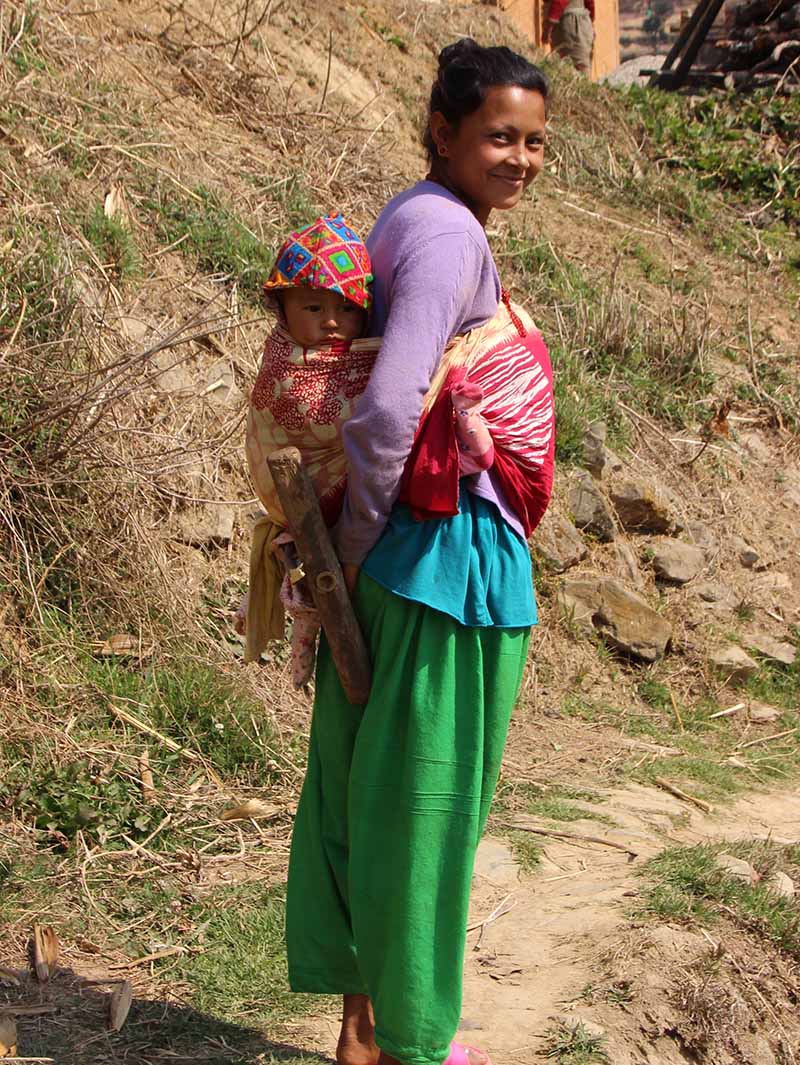
I soon realized that foreigners have a Pied Piper Effect on the Nepali children and stray dogs when walking about the fields and villages. Every walk I picked up either children or dogs to follow me and join me on my walkabouts. It is a wonder that I did not bring home one of these darling Nepali kids or puppies. The children would usually gather and giggle, shouting, “Namaste, where you going?” I discovered that most Nepalese people love having their photos taken, including the children. Often, I would linger with the children, attempting to communicate through the language barriers and take photos. If all we experienced were giggles, “Namaste” and a photo, that was enough for my heart to sing. These children are different from ones in western cultures, because they are not coddled and overprotected. I refer to them endearingly as “wild childs.” Their clothing almost always never matches and they’re usually sporting dirt, a snotty nose or wild hair. Once, I even saw a toddler playing with a sickle. Can you imagine any of this in the suburbs of the U.S.? These kids are tough and crying doesn’t get them anywhere. Often, the mother will carry the baby on her back while working in the fields. One time I found a silent little girl about 3 years old, alone, in the cauliflower field. She just curiously stared at me, while I attempted to evoke a response with ‘Namaste’. Moments later, I saw this 3-year old walking down the path, nonchalantly, leading her mother past 2 water buffaloes, just a hairbreadth away. I timidly followed her, thinking, if this child can walk next to these beasts, so can I.
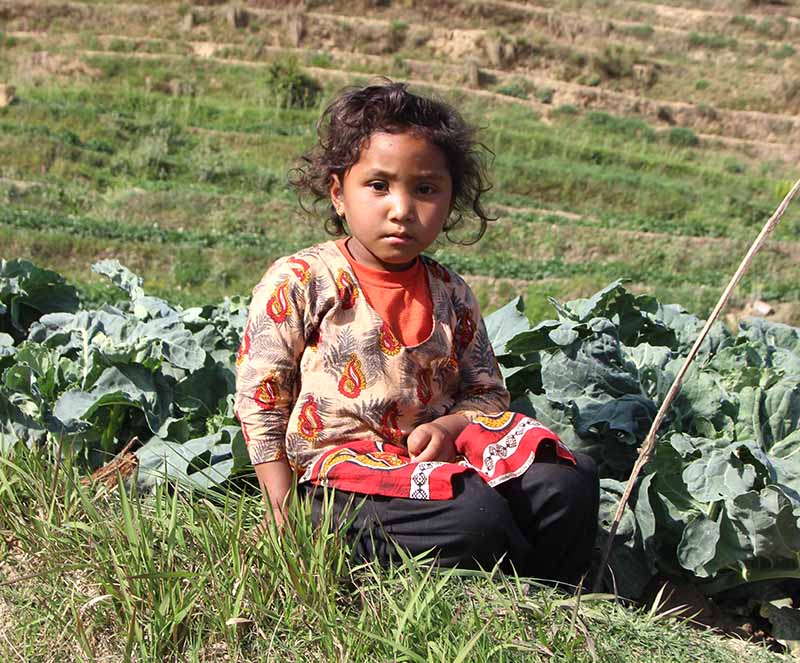
In rural Nepal, there are a lot of stray dogs that are territorial and can behave more violently then the domesticated ones in western cultures. One time as I was walking the road out of town, a couple dogs approached me growling. It was scary enough for me to turn around and walk the other way. I noticed another golden, short-haired dog silently begin to follow me. At first, I was a bit scared, but began to realize his kind intentions. I started to feel like this dog was looking after me to keep me safe. (No, I did not have food in my pack.) He closely followed me for over an hour, down into the valley and even sat with me on a hilltop for some silent, contemplation. Then, he followed me all the way back to my door at the ARP site. I call this dog “Yoda” because he is wise; and in my photo, his ears are flattened on his sides like Yoda. Ironically, I had taken this photo a week before he followed me, while he sat on the edge of a steep bank overlooking the beautiful, lush valley with a large, delicious bone all to himself. I noticed right away this dog’s sweet energy and took his photo. Little did I know, Yoda would soon be my guardian angel during a walkabout.
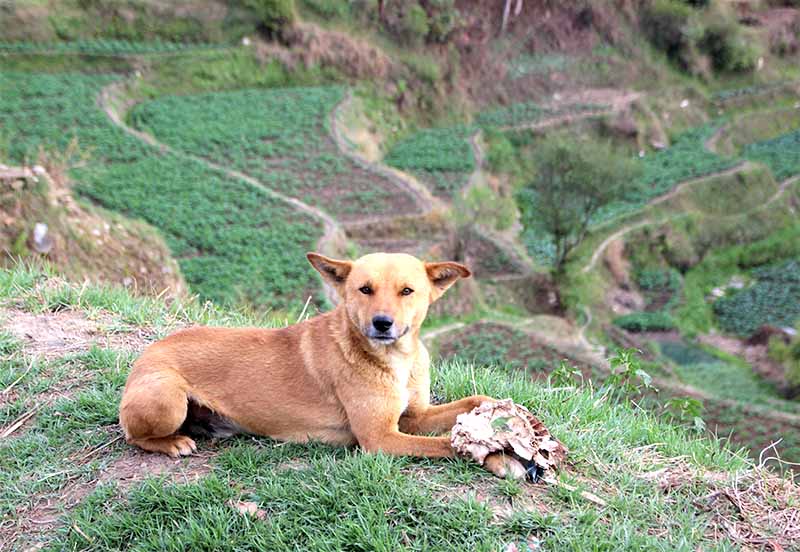
My walks through the fields and villages in the Makawanpur district of Nepal became ritual journeys during my time living there. The harmony of the lush landscapes and vibrant culture, along with the Nepali people’s rooted connection to nature, created special memories for me that will live on in my heart forever. I reflect back on the lifestyles and culture of Nepalese, “subsistence farmers”; and how in the west, these people would be considered impoverished and underprivileged. Hmmm, maybe the world has got it all backwards? These people live amongst cohesive communities and families (with minimal crime or divorces), panoramic views, clean air with deep connection to land and their food source, eating simple diets of rice, vegetables, chicken or buffalo meat and tea. Yes, they work hard, but they also have no need for the gym. How many people in the western cultures in their 60’s or 70’s can even walk up a very steep hill, let alone with a doko full of potatoes on their back? Who really is impoverished here? However, the one thing these people do lack is proper healthcare, and I am so grateful to have been a part of the solution through ARP to fill this void for these amazing people and culture. Namaste Nepal, I love you and promise to return! ---Trudy Wendelin
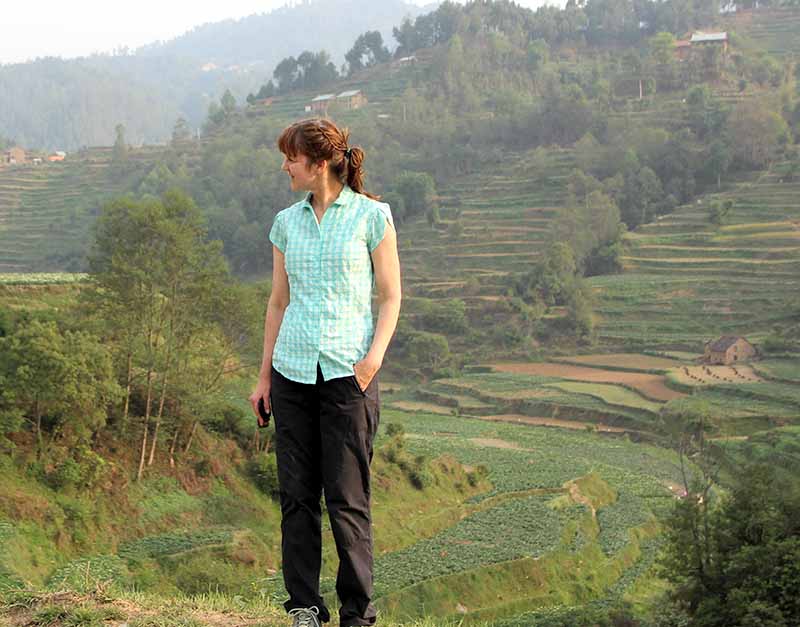
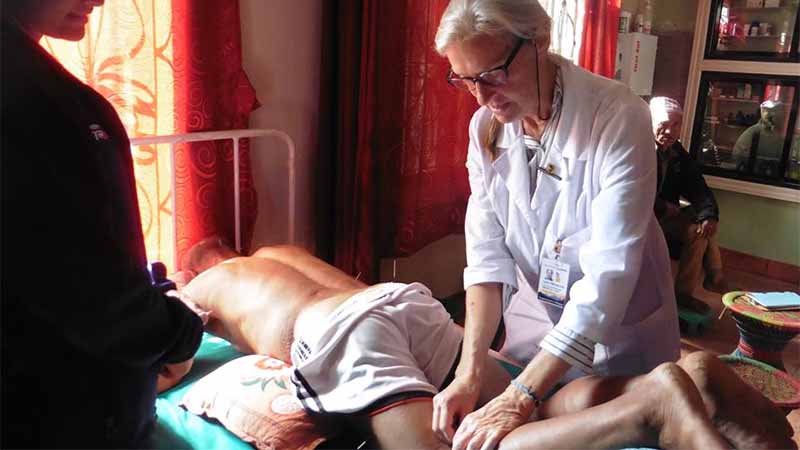
- Details
- By Lynn Minervini

I’ve been moving around for awhile, but for most of my life I lived in one place. There is much to be said about having roots and feeling at home. Nonetheless when you change places it gets easier and easier to feel at home.
So for two months Bajrabarahi was home. It may sound odd, but perhaps it was easy for me to feel at home there because it reminded me so much of my old home. Walking through the hills around Bajrabarahi was a constant déjà vu.
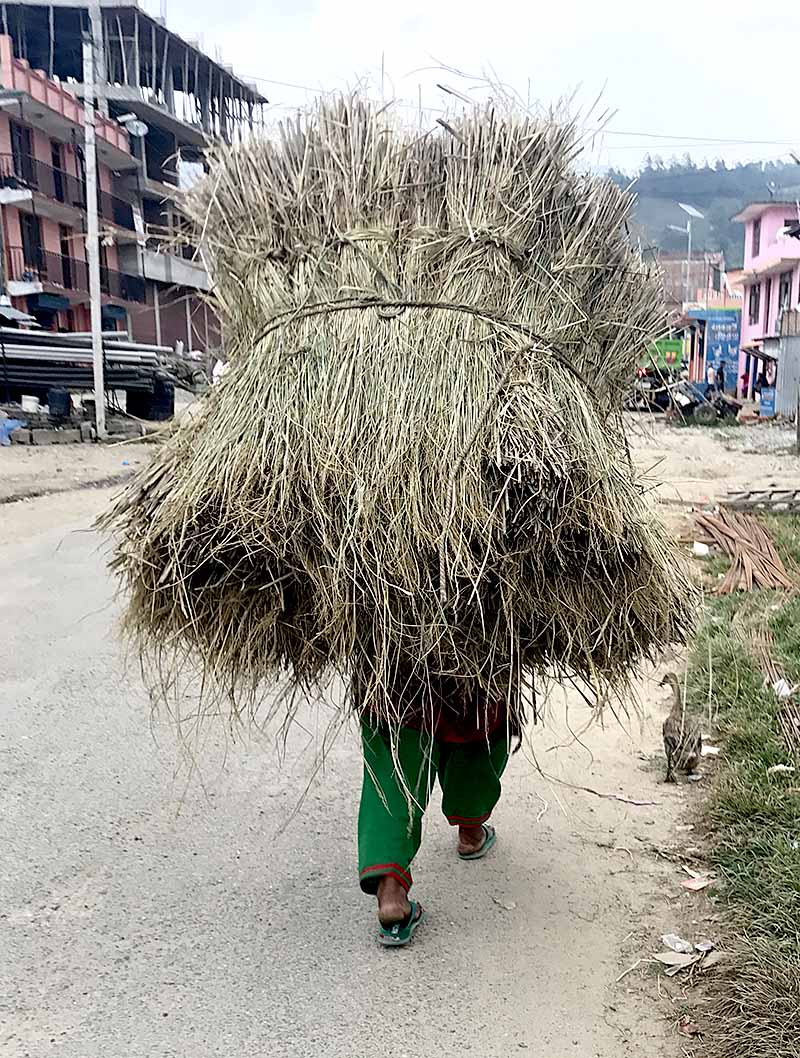
In many ways Bajrabarahi was like my old home. Where I lived in the Apennine mountains in Central Italy, the houses are made of stone. Since the area is subject to earthquakes, the houses are often cracked, often abandoned. A wood stove and a fire cooks the food and keeps you warm. Water comes from the spring.
Just one generation before my time, the hills were terraced and ploughed by oxen, wheat was threshed the way rice is threshed in Bajra. Life is hard. The farmers say: “la terra è bassa!” The ground is low! You have to bend down to do whatever needs to be done.
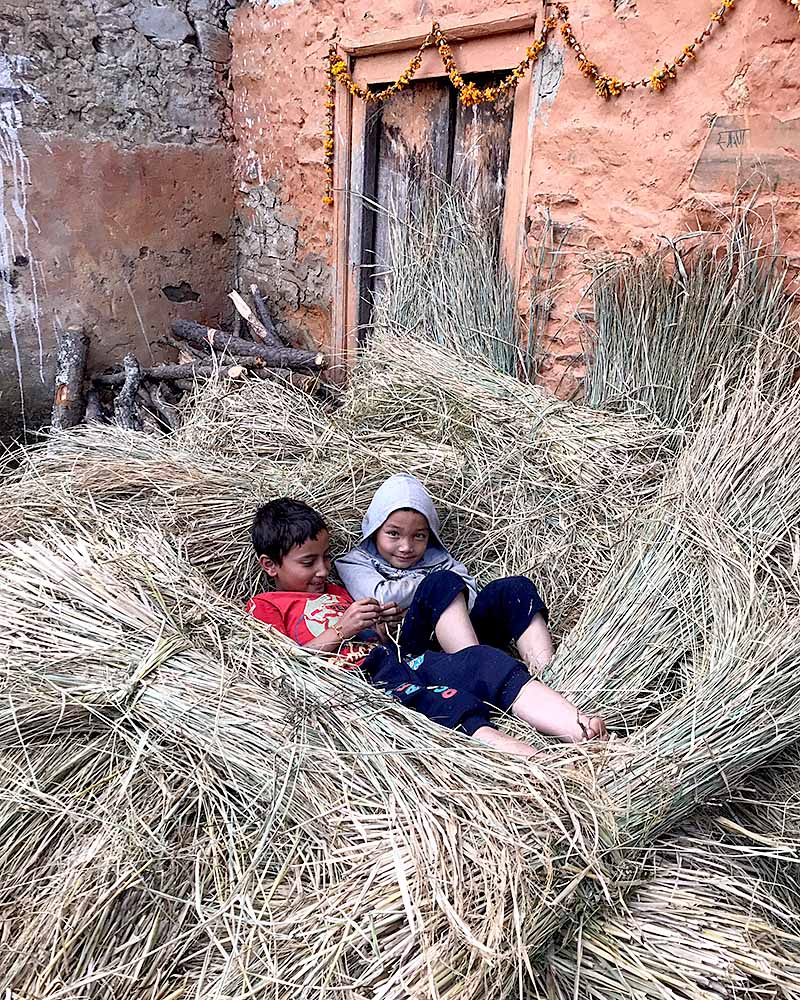
If anything creates roots it is working the land. The land is measured in palm widths, my uncle would say. When you’ve been out there with the hoe, you know where it’s softer, where it’s deeper, where there are more stones. Working the land with your hands in the earth is, I believe, our greatest connection to the grand flow of humanity. It connects us to all our ancestors, from our mothers thousands of years ago collecting and sowing wild seeds to every farmer all over this earth who sows, harvests and feeds the world.
I’m relieved not to be a farmer any more. I don’t have to run down and milk the cow, split and stack wood. It’s not just all the hard work - I don’t have to worry when it will stop raining so I can plant the fields, or worry that the weather will change before I can harvest my crops. But there is nothing like that connection to the soil, to a place.
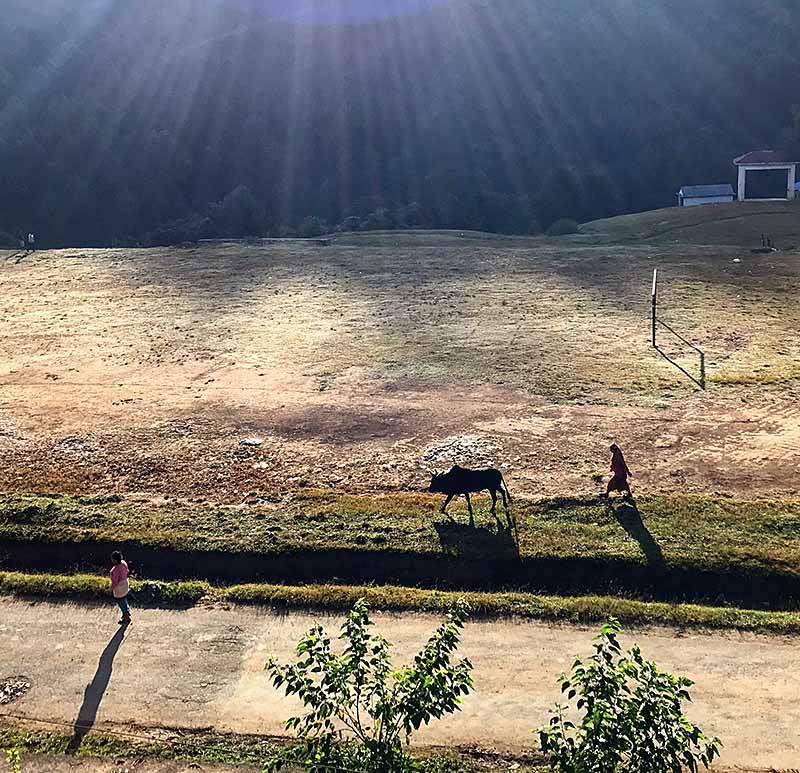
I have so much respect for the farmers in Bajrabarahi because not only do they work hard, they work beautifully. They arrange the cut stalks of rice and corn with attention and care. They plant hedges along the sides of the terraces, flowers in their gardens. Each terraced field with perfect rows demonstrates that these are people who do all their hard work with dignity and love.
Attention to the noble work of farming is important to us as acupuncturists and East Asian medicine practitioners. The roots of our medicine come from an agricultural society and much of the theory of East Asian medicine is not complicated or philosophical, it is simply farmer’s logic. For example, water puts out a fire, fire melts the metal to make an ax to cut wood, plant the same crop too long in the same field and the earth is exhausted, the earth is piled up or dug to make canals to control the water.
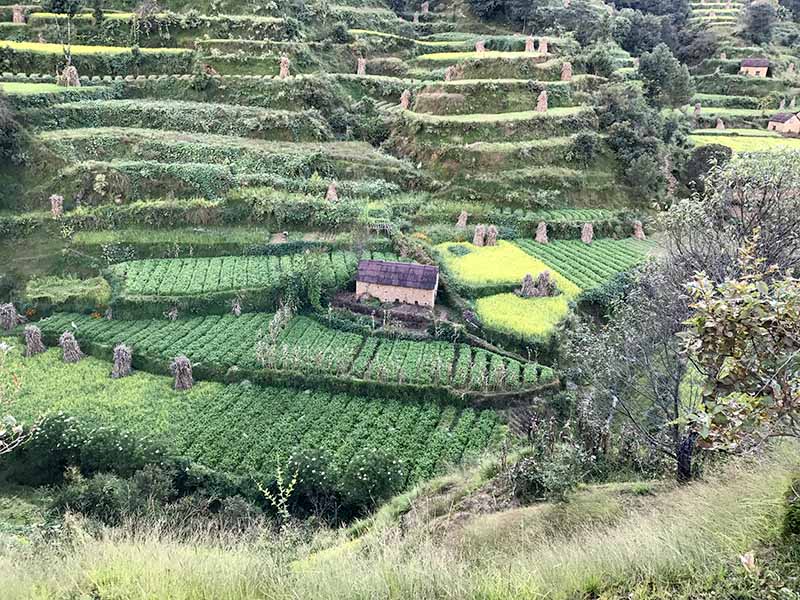
When you dig a ditch for water you know you’ll have to keep it cleared of debris for the water to flow smoothly. Our needles or hands are the shovels and hoes that clear the channels so everything can flow and pain can be relieved.
Attention to the weather, to wind, damp, heat, and cold are just as important to us as they are to a farmer. We must be watchful for changes and act with good timing.
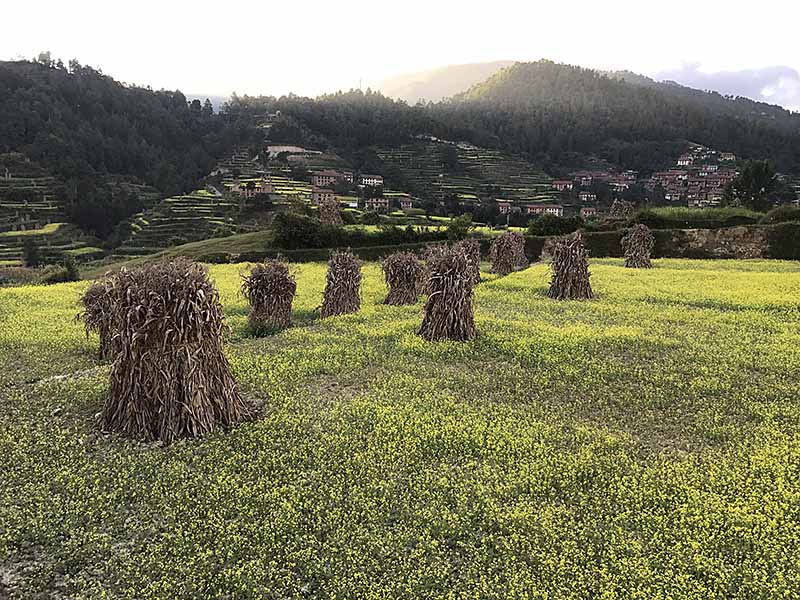
It is both respectable and useful to be a good farmer or a good doctor. The farmers of Bajrabarahi make good patients, their sense of humor (or their shyness) and their dignity accompany their sore knees and backs. With them I’ve reflected on how the course of your life can change in a moment with an accident, a fever, or a stroke. I’ve been amazed at their resilience and determination in dealing with their maladies and hardships.
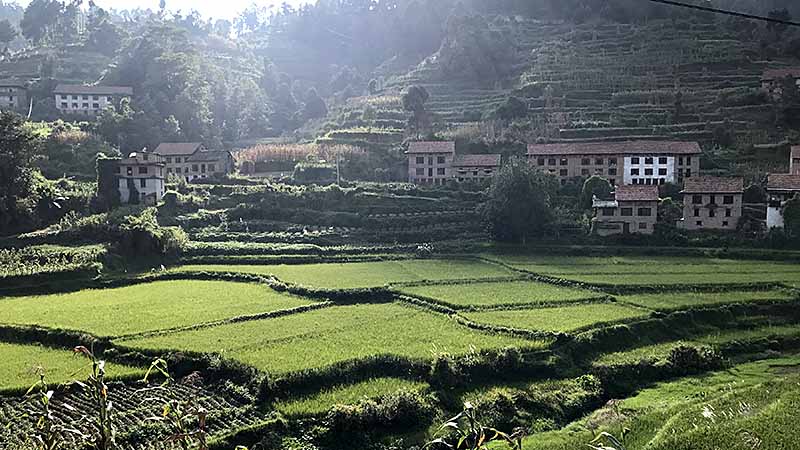
My patients were always pleased to know that I once had a cow and grew channa and dhal! I never worked as hard as they do, but I’m glad my life experience has given me an inkling of what their lives are like. --- Lynn Minervini
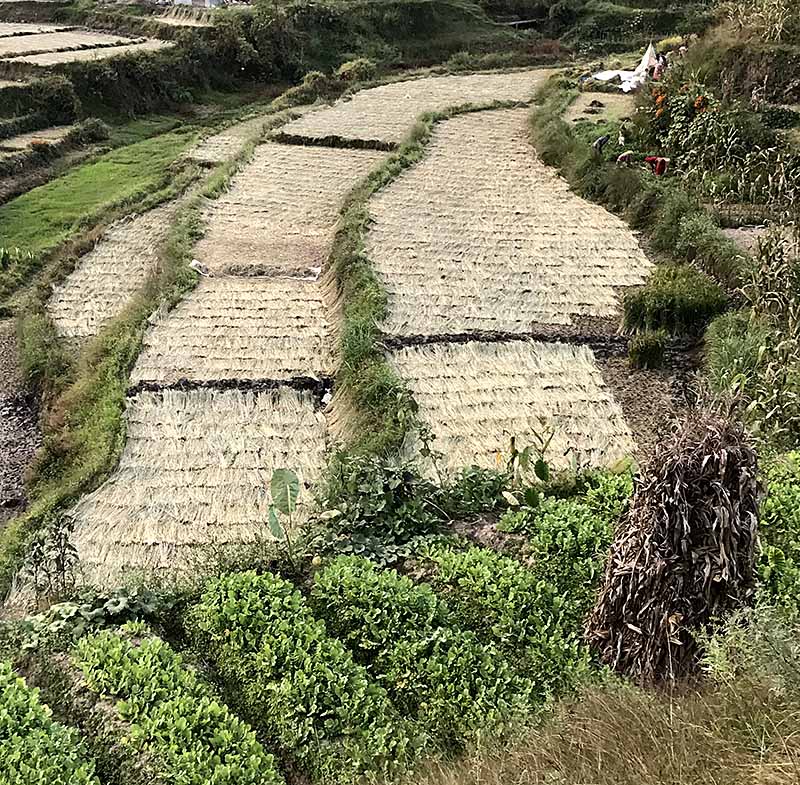
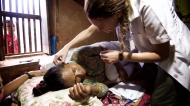
- Details
- By Andrew Schlabach
Our Mission
Acupuncture Relief Project, Inc. is a volunteer-based, 501(c)3 non-profit organization (Tax ID: 26-3335265). Our mission is to provide free medical support to those affected by poverty, conflict or disaster while offering an educationally meaningful experience to influence the professional development and personal growth of compassionate medical practitioners.
